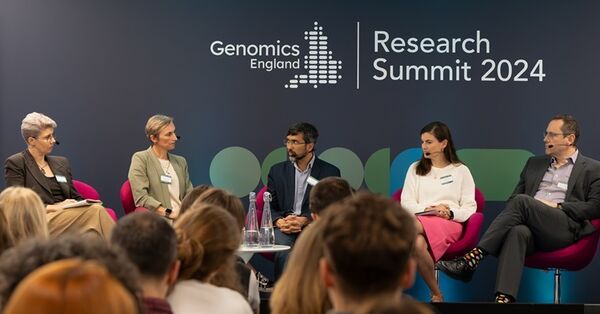Genomics England Research Summit: Innovations, breakthroughs and asking the big questions

This year’s Genomics England Research Summit provided an exciting exploration of the latest research and technological innovations from Genomics England and the wider research community.
The programme showcased the difference that genomics can make to people’s lives through some of the most impactful real-life examples seen anywhere in the world, delivered through collaboration with the NHS, academia, industry and participants.
The Summit also demonstrated the UK’s world-leading role in genomics, and the opportunities we have in the future by continuing to ask the big questions to increase the impact of genomics further.
The one-day event included talks, panel discussions, posters and exhibitions across advances in the diagnosis of rare conditions and cancer, pharmacogenomics (how genes affect a person’s response to drugs), therapeutic innovations and trials, and emerging technologies.
The Summit attracted a wide variety of visitors and presenters. This included renowned genomics experts, participants of genomics research projects, bioinformaticians, AI and machine learning specialists, and healthcare chief executives. Read the full programme.
Some of the topics from this year’s talks included:
- The Generation Study. Speakers from Genomics England, Bristol Children's Hospital and the NHS South West Genomic Medicine Service Alliance discussed implementing the groundbreaking Generation Study – which will use whole genome sequencing to look for more than 200 rare conditions in newborns that can be hard to diagnose and for which NHS treatment is available.
- The Yellow Card Biobank. The Medicines and Healthcare products Regulatory Agency presented on the pioneering pilot, launched by the MHRA and Genomics England, discussing how pharmacogenomics can strengthen drug safety. The Yellow Card Biobank recently started investigating a new group of medicines used to prevent strokes and aims to help understand how a patient’s genetic makeup can impact the safety of their medicines. It is part of a long-term vision for more personalised medicine approaches.
- Work from two groups using data held in the National Genomic Research Library that has identified a new non-coding gene as a cause in 60 individuals with previously undiagnosed developmental disorders. This finding has already now impacted many further families worldwide as others begin to test.
- A machine learning model, created at the Institute of Cancer Research, that can predict with a high level of accuracy patients with breast cancer who will respond well to chemotherapy. The model has the potential to change how breast cancer treatment decisions are made. The researchers highlighted that chemotherapy administered before breast cancer surgery can help improve outcomes and increase survival, but only works well in around 40 per cent of patients.
“This year’s Summit was a brilliant showcase of why we get up each morning and why we believe the UK is the place to ask big questions and innovate in genomics, from genomics-enabled therapies from cancer vaccines to rare therapies and beyond as we journey towards preventative genomic healthcare.
“A personal highlight was hearing the real-life examples of the difference that we can and do make to patients and participants’ lives every day. Backing genomic innovation and research in the UK means better health outcomes, productivity, investment, and growth potential.
“A huge thank you to everyone involved for what I think was the best Research Summit to date.”
Dr Rich Scott
Chief Executive Officer at Genomics England


